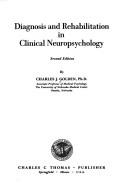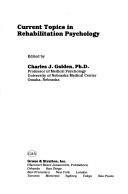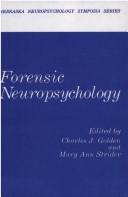| Listing 1 - 10 of 22 | << page >> |
Sort by
|
Book
ISBN: 0808911635 9780808911630 Year: 1979 Publisher: London : Grune & Stratton,
Abstract | Keywords | Export | Availability | Bookmark
 Loading...
Loading...Choose an application
- Reference Manager
- EndNote
- RefWorks (Direct export to RefWorks)
Psychological Tests --- Psychological tests --- Tests psychologiques --- Psychological Tests.

ISBN: 0398044384 Year: 1981 Publisher: Springfield (Ill.): Thomas
Abstract | Keywords | Export | Availability | Bookmark
 Loading...
Loading...Choose an application
- Reference Manager
- EndNote
- RefWorks (Direct export to RefWorks)
Brain --- -Brain damage --- -Clinical neuropsychology --- Psychological tests --- Mental tests --- Psychological assessment --- Tests, Psychological --- Psychology --- Testing --- Clinical psychology --- Educational tests and measurements --- Behavioral neurology --- Neurology, Behavioral --- Neuropsychology --- Psychology, Pathological --- Cerebrum --- Mind --- Central nervous system --- Head --- Localization of functions --- Diagnosis --- Methodology --- Diseases --- Wounds and injuries --- Brain damage --- Clinical neuropsychology --- Brain function localization --- Cerebral localization --- Localization of cerebral functions --- Functional localization --- Neurophysiology --- Phrenology
Book
ISBN: 0205125220 Year: 1990 Publisher: London Allyn and Bacon
Abstract | Keywords | Export | Availability | Bookmark
 Loading...
Loading...Choose an application
- Reference Manager
- EndNote
- RefWorks (Direct export to RefWorks)
Book
Year: 1985 Publisher: Los Angeles, Ca : Western Psychological Services
Abstract | Keywords | Export | Availability | Bookmark
 Loading...
Loading...Choose an application
- Reference Manager
- EndNote
- RefWorks (Direct export to RefWorks)

ISBN: 0808916416 Year: 1974 Publisher: Orlando Institute of internal auditors
Abstract | Keywords | Export | Availability | Bookmark
 Loading...
Loading...Choose an application
- Reference Manager
- EndNote
- RefWorks (Direct export to RefWorks)
People with disabilities --- Rehabilitation --- Psychological aspects
Book
ISBN: 3319047922 3319047914 Year: 2014 Publisher: Cham : Springer International Publishing : Imprint: Springer,
Abstract | Keywords | Export | Availability | Bookmark
 Loading...
Loading...Choose an application
- Reference Manager
- EndNote
- RefWorks (Direct export to RefWorks)
The diagnosis of deficits in brain function can have a critical impact on a defendant's verdict and sentencing. But to measure illness or impairment properly--especially when dangerous offenders face lengthy sentences or the death penalty--professionals need to choose tests that satisfy legal as well as clinical concerns. Forensic Neuropsychological Evaluation of the Violent Offender sorts out the complex issues involved in designing a relevant test battery and conducting an effective evaluation. Geared toward the non-specialist reader, this brief resource synthesizes the database on offender populations and individual case studies to fine-tune approaches to testing in core areas including brain injury, personality, intelligence, cognitive functioning, sensory and motor skills, and attention. Real-world context illustrates how evaluation data may be used in case building--and gamesmanship--by the prosecution or the defense. The resulting volume offers solid guidance on raising standards for how evaluations are done, and for their judicious use by the justice system. Among the issues covered: The role of client history in forensic neuropsychological testing. The impact of different brain injuries on aggression and offending. Strengths and limitations of brain imaging. Evaluating executive function: beyond scoring. Testing for exaggeration and malingering. Qualifying for neuropsychological work in forensic settings. Forensic Neuropsychological Evaluation of the Violent Offender will interest health care providers, researchers, legislators, and law enforcement personnel in their efforts with this marginalized and understudied population. In addition, this text could be useful for students interested in fields such as criminal justice, psychology, and law.
Forensic neuropsychology. --- Violent offenders --- Cognitive psychology. --- Sex. --- Clinical psychology. --- Sex customs. --- Psychology. --- Psychiatry --- Psychology, Applied --- Psychological tests --- Psychology, Cognitive --- Cognitive science --- Psychology --- Dangerous criminals --- Dangerous offenders --- Insane, Criminal and dangerous --- Violent criminals --- Criminals --- Medicolegal neuropsychology --- Forensic neurology --- Forensic psychology --- Neuropsychology --- Customs, Sex --- Human beings --- Sexual behavior --- Sexual practices --- Manners and customs --- Moral conditions --- Sex --- Gender (Sex) --- Human sexuality --- Sex (Gender) --- Sexuality --- Sexology --- Consciousness. --- Sexual behavior. --- Psychology, clinical. --- Cognitive Psychology. --- Sexual Behavior. --- Clinical Psychology. --- Apperception --- Mind and body --- Perception --- Philosophy --- Spirit --- Self --- Sexual psychology. --- Psychology, Sexual --- Sexual behavior, Psychology of --- Sexual psychology --- Sensuality --- Psychological aspects
Book
ISBN: 0398038619 Year: 1979 Publisher: Springfield Thomas
Abstract | Keywords | Export | Availability | Bookmark
 Loading...
Loading...Choose an application
- Reference Manager
- EndNote
- RefWorks (Direct export to RefWorks)
Book
ISBN: 3030232883 3030232875 Year: 2019 Publisher: Cham : Springer International Publishing : Imprint: Springer,
Abstract | Keywords | Export | Availability | Bookmark
 Loading...
Loading...Choose an application
- Reference Manager
- EndNote
- RefWorks (Direct export to RefWorks)
The term chronic traumatic encephalopathy (CTE) has recently gained a significant amount of media coverage. However, a large proportion of the information disseminated through the media pertaining to the etiology, neuropathology, and clinical manifestations of CTE are not corroborated by empirical research, and are disputed by prominent researchers who study sports related head injury. This book reviews the existing literature pertaining to these components of CTE and includes unique case studies of several retired NFL players that received a comprehensive neuropsychological battery from a board certified neuropsychologist, among other populations. It investigates the claim that CTE causes depression, violent behavior, and an increased risk for suicide by providing an in depth discussion using empirical data. Highlighting the importance of adhering to post concussion protocol and appreciating the long-term consequences of repeated head trauma, this unique review of the current research on CTE will be useful to students and professionals in psychology and neurology. .
Brain --- Central nervous system --- Diseases. --- Sports-Psychological aspects. --- Sport Psychology. --- Chronic Traumatic Encephalopathy --- diagnosis. --- psychology. --- complications. --- Chronic traumatic encephalopathy. --- Sports—Psychological aspects.

ISBN: 0306423944 Year: 1986 Publisher: London Plenum
Abstract | Keywords | Export | Availability | Bookmark
 Loading...
Loading...Choose an application
- Reference Manager
- EndNote
- RefWorks (Direct export to RefWorks)
Book
ISBN: 1280207272 9786610207275 0306471744 Year: 2002 Publisher: New York : Kluwer Academic Publishers,
Abstract | Keywords | Export | Availability | Bookmark
 Loading...
Loading...Choose an application
- Reference Manager
- EndNote
- RefWorks (Direct export to RefWorks)
The inter-comparison of specific skills as represented by performance on neu- psychological tests is at the heart of the neuropsychological assessment process. However, there is a tendency to regard the interpretation of single tests as a process that is independent of performance on other tests, with integration of test information representing a summary of these individual test performances. As neuropsychology has become increasingly sophisticated, it has been recognized that many factors influence the performance on any given test. The meaning of the same score may vary considerably from one person to another, depending on his or her performance on other neuropsychological tests. Thus, a low score on the Halstead Category Test may indeed reflect frontal lobe damage, but only if we first rule out the influence of visual-spatial problems, emotionality, attentional issues, motivation, fatigue, and comprehension of the instructions. Simplistic interpre- tions that assume a common interpretation based on a specific score will inva- ably lead to errors in interpretation and conclusions. The purpose of this book is to provide each test that is described with a compendium of the possible interpretations that can be used with a variety of common tests that are often included in a neuropsychological test battery. The first chapter discusses some of the pitfalls and cautions when comparing the tests, while the second chapter examines administrative and scoring issues that may be unclear or unavailable for a given test.
Neuropsychological tests --- Mental illness --- Interpretation. --- Diagnosis. --- Psychology, clinical. --- Neurology. --- Psychiatry. --- Neuropsychology. --- Clinical Psychology. --- Clinical psychology. --- Neurology . --- Medicine and psychology --- Mental health --- Psychology, Pathological --- Medicine --- Nervous system --- Neuropsychiatry --- Psychiatry --- Psychology, Applied --- Psychological tests --- Neurophysiology --- Psychophysiology --- Diseases --- Psychiatric diagnosis --- Psychodiagnostics --- Neuropsychological assessment --- Neuropsychological evaluation --- Tests, Neuropsychological --- Clinical neuropsychology --- Neurologic examination
| Listing 1 - 10 of 22 | << page >> |
Sort by
|

 Search
Search Feedback
Feedback About UniCat
About UniCat  Help
Help News
News